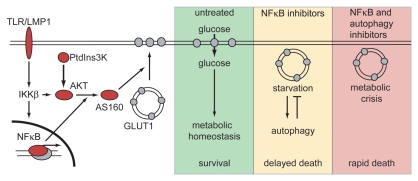Figure 1.
The NFκB pathway induces glucose import to support survival of B-cell lymphomas; autophagy prolongs survival after NFκB inhibition. Stimulation of NFκB by TLRs or EBV-LMP1 promotes GLUT1 translocation to the plasma membrane at two distinct points. IKKβ and PtdIns3K cooperate to activate AKT, whereas NFκB-driven transcription is essential for AKT-mediated AS160 phosphorylation. In NFκB-high, untreated lymphomas, GLUT1-mediated glucose import supports proliferation and survival. After NFκB inhibition, lymphoma cells are deprived of glucose, causing starvation-induced autophagy that delays death. When NFκB and autophagy are inhibited simultaneously, lymphoma cells die rapidly of a metabolic crisis.

